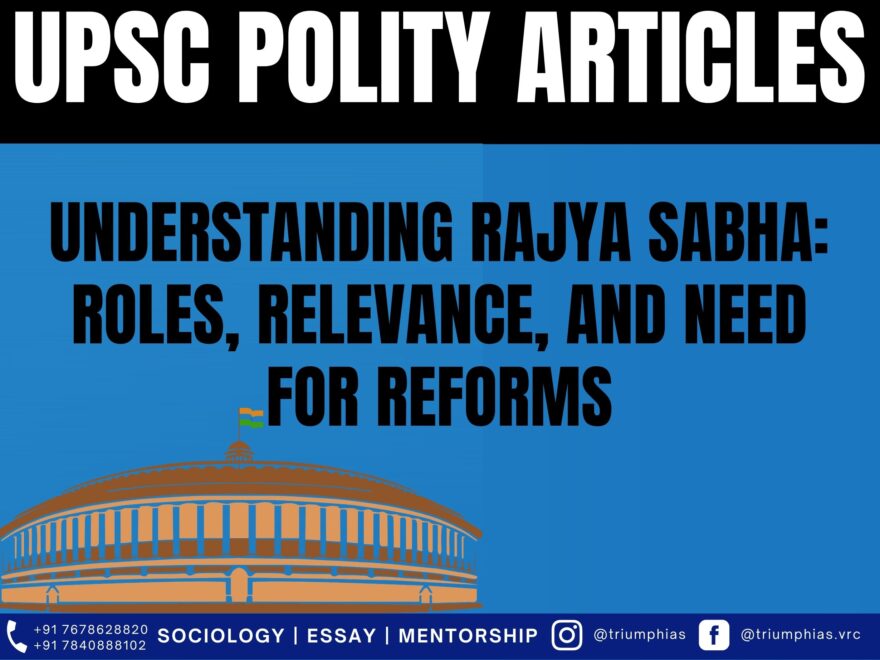Rajya Sabha
(Relevant for Polity Section of General Studies Paper Prelims/Mains)

Rajya Sabha
Rajya Sabha, also known as the Council of States, constitutes the upper chamber of the Indian Parliament. This house serves as a representation of the states and union territories within the federal structure of the country. It holds a permanent status and is not subject to dissolution; however, every two years, one-third of its members retire from their positions.
Role and relevance:
- Law-Making: Rajya Sabha, the upper house of the Indian Parliament, collaborates in the legislative process alongside the lower house, Lok Sabha. It possesses the authority to initiate, modify, or reject bills, excluding money bills, which are under the exclusive jurisdiction of Lok Sabha. Within a 14-day timeframe, it can also provide recommendations on money bills. In case of a legislative impasse between the two chambers, a joint session can be convened, in which Lok Sabha holds an advantage due to its larger size and numerical superiority. Furthermore, Rajya Sabha lacks the ability to introduce or amend constitutional amendment bills, which necessitate a distinct majority in both houses.
- Oversight: Rajya Sabha exercises oversight over the executive by posing queries, introducing motions, adopting resolutions, calling for discussions, and more. Notably, Rajya Sabha doesn’t influence the formation or dissolution of the government, which solely hinges on majority support in Lok Sabha.
- Representation: Rajya Sabha embodies India’s federal structure and diversity by giving a platform to the states and union territories within the national legislature. It mirrors the country’s pluralism and diversity by accommodating a range of parties, factions, and interests in its composition. However, Rajya Sabha’s representation isn’t proportionate to states’ and union territories’ populations, as it has a maximum of 250 elected members and mandates a minimum of one representative for each state and union territory. Additionally, certain states and union territories are either disproportionately represented or underrepresented in Rajya Sabha due to historical reasons or strategic political considerations.
- Deliberation: Rajya Sabha serves as a chamber for extensive debate and discourse on national and international matters of significance. It offers a platform for the expression of varied viewpoints and perspectives, as well as for the examination and refinement of policies and statutes. It benefits from the expertise and knowledge of its members, especially those nominated, who enhance discussions with their insights and expertise. However, the quality and quantity of deliberations in Rajya Sabha have waned over time due to factors like frequent disruptions, partisan politics, a lack of decorum, quorum shortages, misuse of regulations, and more.
Reforms:
- Enhancing Legislative Authority: To fortify the law-making process, it is imperative to empower Rajya Sabha further, particularly in issues concerning states and union territories. Its autonomy should be bolstered, and it should be consulted prior to convening joint sessions or passing constitutional amendments. Additionally, Rajya Sabha influence over money bills, which often encompass non-financial subjects affecting its domain, should be expanded.
- Amplifying Oversight: Rajya Sabha oversight role over the executive should be more assertive and impactful, employing an array of parliamentary instruments and mechanisms. It should be accorded a greater role and sway in the selection and dismissal of pivotal constitutional functionaries, including judges, election commissioners, CAG, CVC, and more. Furthermore, Rajya Sabha should be granted augmented access to executive information and documents to facilitate informed scrutiny.
- Enhancing Representation: Reforming Rajya Sabha is essential to ensure equitable representation of states and union territories commensurate with their populace. Striving for balanced inclusion, Rajya Sabha should work towards substantial representation of women, minorities, and disadvantaged sections within its composition. Furthermore, prudence demands refraining from nominating individuals with political affiliations or conflicts of interest.
- Cultivating Deliberation: Nurturing a culture of discourse and discussion among its members should be a focal point for Rajya Sabha, abiding by parliamentary conduct rules and norms. Encouraging heightened participation and attendance by members is crucial, and imposing sanctions for absenteeism or unruly behaviour can be considered. Harnessing technological advancements and innovative approaches will augment Rajya Sabha’ deliberative prowess and extend its outreach.
Rajya Sabha is an integral and indispensable part of the Indian parliamentary system that performs various roles and functions in the governance and development of the country. It is also a symbol of India’s federalism and diversity that reflects its constitutional values and vision. However, it also faces some challenges and limitations that hamper its effectiveness and accountability. Therefore, it needs to be reformed and revitalized to meet the expectations and aspirations of the people and the nation.
To master these intricacies and fare well in the Sociology Optional Syllabus, aspiring sociologists might benefit from guidance by the Best Sociology Optional Teacher and participation in the Best Sociology Optional Coaching. These avenues provide comprehensive assistance, ensuring a solid understanding of sociology’s diverse methodologies and techniques.
Rajya Sabha, Indian Parliament, Law-Making, Oversight, Federal Structure, Representation, Deliberation, Parliamentary Reforms, Governance, Democracy, Rajya Sabha, Indian Parliament, Law-Making, Oversight, Federal Structure, Representation, Deliberation, Parliamentary Reforms, Governance, Democracy, Best Sociology Optional Coaching, Sociology Optional Syllabus.
Sample Question for UPSC Sociology Optional Paper:
- What is the primary legislative role of the Rajya Sabha?
Answer: To collaborate in the law-making process alongside the Lok Sabha, except for money bills.
- Can the Rajya Sabha initiate constitutional amendments?
Answer: No, it lacks the ability to introduce or amend constitutional amendment bills.
- How does Rajya Sabha exercise oversight over the executive?
Answer: By posing queries, introducing motions, adopting resolutions, and calling for discussions.
- What is the key limitation of Rajya Sabha in terms of representation?
Answer: It isn’t proportionate to states’ and union territories’ populations.
- Why is Rajya Sabha known as a permanent house?
Answer: It is not subject to dissolution; one-third of its members retire every two years.
- What are some challenges to deliberation within Rajya Sabha?
Answer: Frequent disruptions, partisan politics, and a lack of decorum.

Choose The Best Sociology Optional Teacher for IAS Preparation?
At the beginning of the journey for Civil Services Examination preparation, many students face a pivotal decision – selecting their optional subject. Questions such as “which optional subject is the best?” and “which optional subject is the most scoring?” frequently come to mind. Choosing the right optional subject, like choosing the best sociology optional teacher, is a subjective yet vital step that requires a thoughtful decision based on facts. A misstep in this crucial decision can indeed prove disastrous.
Ever since the exam pattern was revamped in 2013, the UPSC has eliminated the need for a second optional subject. Now, candidates have to choose only one optional subject for the UPSC Mains, which has two papers of 250 marks each. One of the compelling choices for many has been the sociology optional. However, it’s strongly advised to decide on your optional subject for mains well ahead of time to get sufficient time to complete the syllabus. After all, most students score similarly in General Studies Papers; it’s the score in the optional subject & essay that contributes significantly to the final selection.
“A sound strategy does not rely solely on the popular
Opinion of toppers or famous YouTubers cum teachers.”
It requires understanding one’s ability, interest, and the relevance of the subject, not just for the exam but also for life in general. Hence, when selecting the best sociology teacher, one must consider the usefulness of sociology optional coaching in General Studies, Essay, and Personality Test.
The choice of the optional subject should be based on objective criteria, such as the nature, scope, and size of the syllabus, uniformity and stability in the question pattern, relevance of the syllabic content in daily life in society, and the availability of study material and guidance. For example, choosing the best sociology optional coaching can ensure access to top-quality study materials and experienced teachers. Always remember, the approach of the UPSC optional subject differs from your academic studies of subjects. Therefore, before settling for sociology optional, you need to analyze the syllabus, previous years’ pattern, subject requirements (be it ideal, visionary, numerical, conceptual theoretical), and your comfort level with the subject.
This decision marks a critical point in your UPSC – CSE journey, potentially determining your success in a career in IAS/Civil Services. Therefore, it’s crucial to choose wisely, whether it’s the optional subject or the best sociology optional teacher. Always base your decision on accurate facts, and never let your emotional biases guide your choices. After all, the search for the best sociology optional coaching is about finding the perfect fit for your unique academic needs and aspirations.
To master these intricacies and fare well in the Sociology Optional Syllabus, aspiring sociologists might benefit from guidance by the Best Sociology Optional Teacher and participation in the Best Sociology Optional Coaching. These avenues provide comprehensive assistance, ensuring a solid understanding of sociology’s diverse methodologies and techniques. Sociology, Social theory, Best Sociology Optional Teacher, Best Sociology Optional Coaching, Sociology Optional Syllabus.
Best Sociology Optional Teacher, Sociology Syllabus, Sociology Optional, Sociology Optional Coaching, Best Sociology Optional Coaching, Best Sociology Teacher, Sociology Course, Sociology Teacher, Sociology Foundation, Sociology Foundation Course, Sociology Optional UPSC, Sociology for IAS,
Follow us :
🔎 https://www.instagram.com/triumphias
🔎https://www.youtube.com/c/TriumphIAS
https://t.me/VikashRanjanSociology
Find More Blogs
|
Scope of the subject and comparison with other social sciences |
|||
|
|
|
|
Modernity and social changes in Europe |

